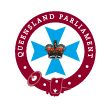-
Visit and learn
- Message from the Speaker
-
About Us
- A day in the Life of the Queensland Parliament
- The Executive Government of Queensland
- Officers of the Queensland Parliament
- The Origins of the Queensland Parliament
- The Queensland Parliament and Parliamentary Process
- Parliamentary Scrutiny via Parliamentary Committees
- The Queensland Parliament and the Financial Process
-
The Queensland Parliament and the Legislative Process
- The Queensland Constitution
- The Queensland Electoral System
- The Role of Parliament
- Separation of Powers
- Learn About Parliament
- Information For
- Visitors
- Visit the Public Gallery
- Visit our Gift Shop
- Have Your Say
- Get Involved
- Education and Learning
- History
- Heritage Collections
- Preservation of our Heritage
- Regional Sittings
- CPA Australia and Pacific Regional Conference
- Publications and Reports
- Speakers' Corner
- Opening of the 58th Parliament
- Parliamentary Annexe Reparation and Refurbishment
- Contact Us
Bills of Parliament
A Bill is a proposal for a new law or a proposal to change an existing law presented for debate before Parliament. There are two types of Bills-
Government Bills which form the majority of the State's legislation and relate to public policy, having general application over the entire State, e.g., the Police Service Administration Bill.
Private Members' Bills are bills introduced by an individual Member of Parliament instead of the Government, e.g., the Criminal Code (Palliative Care) Amendment Bill, which was introduced by Mr Peter Wellington MP, an Independent Member. It erased doubts in the grey area of health care law in relation to doctors (and nurses and other people acting under the direction of doctors) who administer palliative care to patients who are dying in pain.
Form of a Bill
A Bill is identified by a Long Title which, in brief terms, describes the purposes of the legislation, e.g., a Bill for an Act to extend the legislative powers of the States in and in relation to coastal waters. For convenience, the Long Title is compressed into a Short Title, allowing easier recognition of the later Act, e.g., Coastal Waters (State Powers) Act 1980.Usually, all Bills are constructed in a particular format, occasionally consisting of a Preamble containing the reasons and objects of the legislation; an Enacting Formula incorporating the authority of the legislature; the Short Title; the Commencement Statement announcing the legislation's operative date; an Interpretation Section providing definitions for key words; the Clauses embodying the legislation's substantive provisions (Clauses can be further divided into Sub-Clauses, Paragraphs, Sub-Paragraphs and are titled Sections when the Bill becomes an Act); Schedules detailing technical requirements; and Associated Memorandum such as a Table of Provisions, Headings, Notes and Explanatory Memorandum.
